Table of Contents
Get started with MyPerfectResume today!
- Build a resume on any device
- Pick an ATS-friendly template
- Tailor with AI copy suggestions
Why this resume works
- Quantifies accomplishments: By illustrating metrics like reducing behavioral issues by 30% in three months, the applicant’s achievement and value become evident.
- Showcases career progression: Transitioning from a behavioral support assistant to a behavior technician, the applicant’s career progression reflects increased responsibilities and growth in the mental health field.
- Uses action-oriented language: Action verbs such as “implemented” and “improved,” the applicant clearly conveys initiative and effectiveness.
More Behavior Technician Resume Examples
Take a look at our behavior technician resume examples to see the best ways to highlight your communication, patience, and observation skills. These social services resume samples will guide you in creating a resume that showcases your ability to support behavioral therapies effectively.
Entry-Level Behavior Technician
Why this resume works
- Effective use of keywords: Using keywords like “behavior intervention” and “functional assessment,” the applicant ensures their resume is optimized for applicant tracking systems (ATS).
- Puts skills at the forefront: Highlighting skills such as client collaboration and therapy facilitation at the top showcases the applicant’s expertise, a smart move for entry-level roles using a skills-based resume format.
- Shows digital literacy: Including technical abilities like progress monitoring software highlights computer skills essential for modern workplaces.
Mid-Level Behavior Technician
Why this resume works
- Includes a mix of soft and hard skills: Balancing interpersonal skills with technical expertise, the applicant navigates complex cases while maintaining a high client satisfaction rate, reflecting adaptability in diverse therapeutic settings.
- Demonstrates language abilities: Multilingual skill in Spanish, French, and Italian enriches the applicant’s language skills, facilitating effective communication across cultural boundaries and improving client interactions.
- Points to measurable outcomes: By achieving a 95% client satisfaction rate and reducing incidents by 40%, the applicant makes clear their ability to drive successful outcomes through strategic interventions.
Experienced Behavior Technician
Why this resume works
- Lists relevant certifications: Listing certifications like Certified Behavior Specialist and Registered Behavioral Technician shows dedication to expertise and lifelong learning.
- Focuses on work history: Using a chronological resume format, the applicant effectively showcases extensive experience in behavioral roles from 2015 to 2025.
- Emphasizes leadership skills: By training over 10 technicians, the applicant’s leadership skills are evident through team management and professional development initiatives.
Behavior Technician Resume Template (Text Version)
Aya Lee
Parkview, MO 64166
(555)555-5555
Aya.Lee@example.com
Professional Summary
Dedicated Behavior Technician skilled in therapy implementation and behavior modification. Proven track record in enhancing client engagement by 30% and reducing issues by 25% using evidence-based approaches.
Work History
Behavior Technician
BrightPath Caregiving – Parkview, MO
June 2023 – August 2025
- Implemented behavior plans with 90% success rate
- Conducted therapy sessions for 5 clients weekly
- Reduced behavioral issues by 30% in 3 months
Mental Health Coach
Riverside Care Group – Parkview, MO
June 2019 – May 2023
- Enhanced patient reporting by 25% efficiency
- Coached 10 clients to improve mental resilience
- Reached 15% increase in session engagement
Behavioral Support Assistant
Compassionate Living Services – Parkview, MO
June 2016 – May 2019
- Facilitated group sessions improving morale by 20%
- Developed support strategies leading to milestone achievements
- Ensured 98% satisfaction in program participation
Skills
- Behavior assessment
- Therapy implementation
- Client engagement
- Behavior modification
- Session facilitation
- Mental health support
- Patient communication
- Problem-solving
Certifications
- Certified Autism Specialist – International Board of Credentialing and Continuing Education Standards
- Behavior Technician Certification – Behavior Analyst Certification Board
Education
Master of Science Psychology
University of California Davis, California
May 2016
Bachelor of Science Psychology
California State University Sacramento, California
May 2014
Languages
- Spanish – Beginner (A1)
- French – Beginner (A1)
- German – Beginner (A1)
Related Resume Guides
Advice for Writing Your Behavior Technician Resume
Dive into our tips on how to write a resume and learn how to showcase your expertise in supporting behavioral health and development effectively.
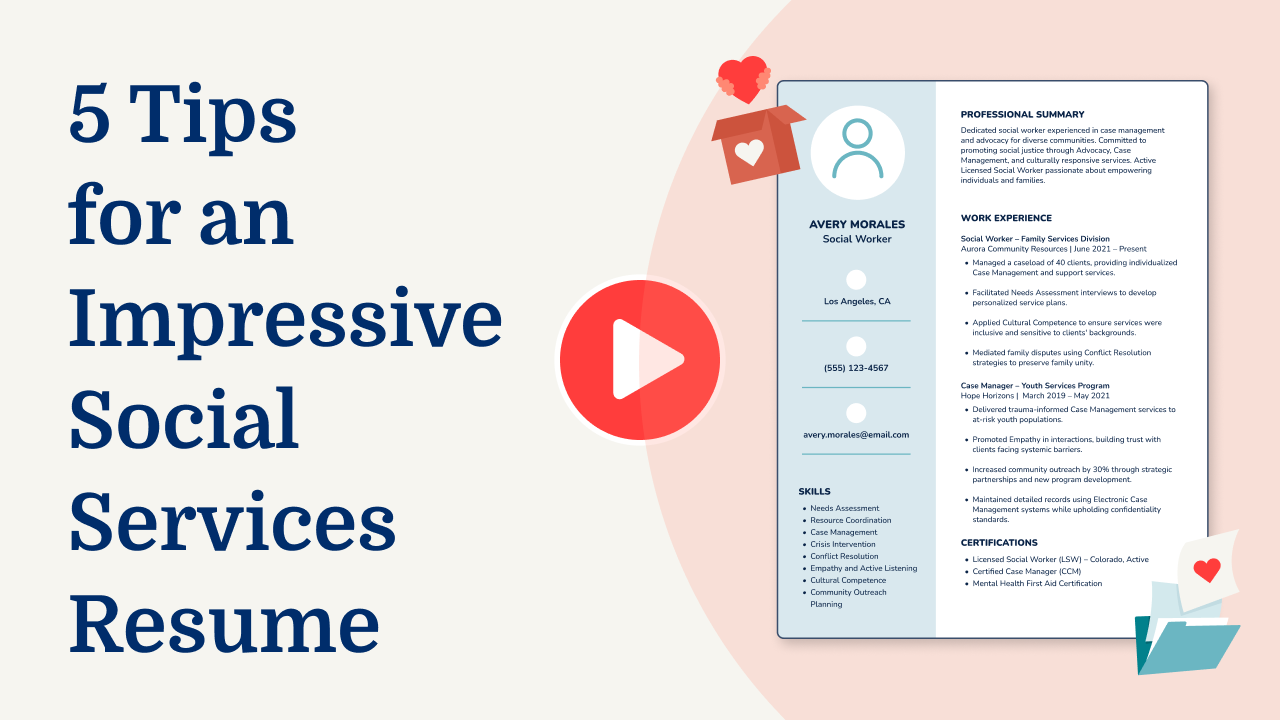
Write a strong professional summary
A professional summary is a snapshot that introduces you to hiring managers, helping them quickly see your fit for a role like behavior technician.
A professional summary is a brief overview that highlights your experience, skills, and achievements. It’s ideal for applicants who have been in their field for some time. This section helps convey your professional identity and value to potential employers by showcasing what you’ve accomplished in past roles.
On the other hand, resume objectives focus on career goals and are better suited for entry-level job seekers, those changing careers, or individuals with employment gaps. While summaries emphasize what you’ve achieved, objectives highlight what you aim to contribute in future roles.
Next, we’ll provide examples of both professional summaries and resume objectives tailored to various industries and levels of experience.
Behavior technician resume summary examples
Entry-level
Recent psychology graduate with foundational knowledge in applied behavior analysis and experience gained through internships. Holds a Registered Behavior Technician (RBT) certification and skilled in implementing behavior intervention plans under supervision. Eager to contribute to a team focused on improving the lives of individuals with behavioral challenges.
Mid-career
Behavior technician with over five years of experience in clinical settings, specializing in autism spectrum disorder support. Proficient in conducting functional assessments and developing tailored interventions. Known for strong collaboration with multidisciplinary teams and dedication to improving client outcomes through evidence-based practices.
Experienced
Veteran behavior technician with expertise in complex cases involving developmental disorders and challenging behaviors. Certified RBT with advanced training in crisis intervention and data-driven decision-making. Proven track record of leading teams to implement successful behavior modification strategies, resulting in measurable improvements for clients across diverse populations.
Behavior technician resume objective examples
Entry-level
Dedicated and empathetic individual with a background in psychology seeking an entry-level behavior technician role. Excited to apply understanding of behavioral principles and passion for helping others to contribute positively to a team focused on improving client outcomes.
Recent graduate
Recent psychology graduate eager to begin a career as a behavior technician. Committed to applying academic knowledge and strong observational skills to support behavioral interventions and improve the quality of care provided to clients.
Career changer
Motivated professional transitioning from customer service into the field of applied behavior analysis. Aiming to leverage excellent communication abilities and problem-solving skills in a behavior technician position, contributing effectively to client-centered therapeutic goals.
Make your resume stand out! Use our Resume Builder to easily highlight your skills as a behavior technician and make sure you get noticed by employers.
Include relevant certifications and training
Listing certifications and training for a behavior technician is key because it shows you have the skills needed to help others effectively. Certifications prove that you’ve learned specific techniques and understand how to use them in real situations.
This can be especially important when working with people who need support, as it builds trust with employers and families. Having a dedicated certifications section on your resume helps highlight these qualifications clearly.
- Registered Behavior Technician (RBT)
- Board Certified Autism Technician (BCAT)
- Applied Behavior Analysis (ABA) Training
- Crisis Prevention Intervention (CPI) Certification
- First Aid and CPR Certification
Having these certifications can make you stand out as a behavior technician. They show you’re ready to handle challenges and provide safe, effective care. Adding them alongside your education section ensures employers see your full range of skills at a glance.
Example of a certifications section
Registered Behavior Technician (RBT)
Issued by: Behavior Analyst Certification Board (BACB)
Expires 2025
First Aid and CPR
Issued by: American Red Cross
Expires 2026
Autism Certificate
Issued by: International Board of Credentialing and Continuing Education Standards (IBCCES)
Issued 2023
Crisis Prevention Intervention (CPI)
Issued by: Crisis Prevention Institute
Expires 2026
Choose a resume template with clear section headings, traditional colors, and professional fonts to ensure your resume passes ATS and lands in hiring manager’s hands.
Showcase your work experience
Relevant work experience on your resume helps hiring managers understand how your past roles have prepared you for the position. Organize your work history in reverse chronological order, listing job title, employer name, location, and employment dates.
This clear structure allows employers to quickly identify your most recent and relevant experience. Use concise, action-oriented language to describe each role while emphasizing accomplishments that align with the responsibilities of a behavior technician.
Focus on measurable results when detailing your contributions. Highlight instances where you helped improve client outcomes or supported specific behavioral plans effectively.
Include core responsibilities like implementing behavior intervention strategies, assisting in data collection for treatment plans, and engaging clients in activities designed to promote positive behaviors. By showing how you’ve successfully performed these duties in previous positions, you can demonstrate readiness for the role.
Avoid generic descriptions and instead provide examples that showcase the impact of your actions. For instance, rather than saying “worked with clients,” detail how you “implemented individualized strategies that reduced undesired behaviors by 20% over three months.” This approach makes your resume stand out by highlighting tangible achievements directly tied to skills needed as a behavior technician.
5 behavior technician work history bullet points
- Facilitated individualized behavioral interventions for 15+ clients, achieving a 25% improvement in target behaviors within 3 months.
- Collaborated with multidisciplinary teams to design treatment plans, resulting in a 30% increase in client goal achievement rates.
- Monitored and documented client progress during sessions, providing data-driven insights that informed therapy adjustments and improved outcomes by 20%.
- Used applied behavior analysis techniques to support skill acquisition, leading to a 40% reduction in maladaptive behaviors among clients.
- Conducted training sessions for parents and caregivers on behavior management strategies, improving their ability to effectively support clients at home.
Select a resume format that highlights your skills in behavior analysis, patient communication, and data collection.
Match your resume with the job description
Tailoring resumes to job descriptions is essential because it helps job seekers stand out and ensures their application gets noticed by both employers and ATS. With ATS software scanning for specific keywords and phrases from job postings, it’s important to align your resume with the language used in the listing.
An ATS-friendly resume uses keywords and phrases that match the skills, qualifications, and experiences described in the job posting. By strategically incorporating these terms into your resume, you improve your chances of passing through automated filters and grabbing the attention of hiring managers.
To identify keywords in a behavior technician job description, focus on repeated terms related to essential responsibilities or qualifications. Examples might include ‘”behavioral analysis,” “data collection,” or “client-centered care.” Using exact phrases found in the posting ensures your resume aligns closely with what employers are looking for.
Incorporating these terms naturally requires mixing them into descriptions of your past roles. For instance, instead of writing “Worked with clients,” revise it to say “Collaborated with clients using behavioral analysis techniques to achieve personalized goals.” This approach integrates key phrases while showcasing relevant experience.
When you customize your resume for ATS compatibility, it improves visibility during hiring processes, increasing opportunities for interviews and advancing career growth.
Make sure your resume stands out! Use our ATS Resume Checker to find formatting problems, missing keywords, and other issues before you send it.
FAQ
Do I need to include a cover letter with my behavior technician resume?
Yes, adding a cover letter to your behavior technician resume can improve your application and boost your chances of catching employers’ attention.
A cover letter is a great way to explain why you’re interested in the role and show how your skills match the clinic or organization’s needs.
For example, if you have experience with specific therapeutic methods or patient demographics that are relevant to the job, make sure to highlight these aspects.
To simplify this process, consider using a Cover Letter Generator; it can help craft a personalized letter based on your resume details and career goals.
Also, exploring various cover letter examples can offer valuable insights into creating an engaging narrative for different positions within behavioral health settings.
How long should a behavior technician’s resume be?
For a behavior technician, an one-page resume is typically ideal as it allows you to concisely showcase your relevant skills and experiences, such as experience with applied behavior analysis (ABA) techniques and any certifications like RBT.
However, if you’ve accumulated extensive experience or completed numerous specialized training programs, opting for a two-page resume might be appropriate. This allows you to provide more detailed insights into your professional journey while maintaining relevance.
Consider exploring our guide on how long a resume should be for specific examples and tips tailored to different career stages.
How do you write a behavior technician resume with no experience?
When creating a resume with no experience, focus on highlighting your skills, education, and any relevant training that aligns with the behavior technician role. Here’s how you can approach it:
- Highlight relevant education: If you’ve studied psychology or any related field, make sure to list your degree prominently along with courses that relate to behavior analysis or child development.
- Include certifications: Mention any certifications like CPR or First Aid and consider taking a Registered Behavior Technician (RBT) course to improve your resume.
- Focus on transferable skills: Emphasize skills such as communication, empathy, patience, and teamwork that are important for working effectively in behavior therapy settings.
- Leverage volunteer experience: Include roles where you’ve worked with children or individuals requiring support, such as tutoring or volunteering at camps. Describe your responsibilities and learnings from those experiences.
Rate this article
Behavior Technician
Share this page
Additional Resources
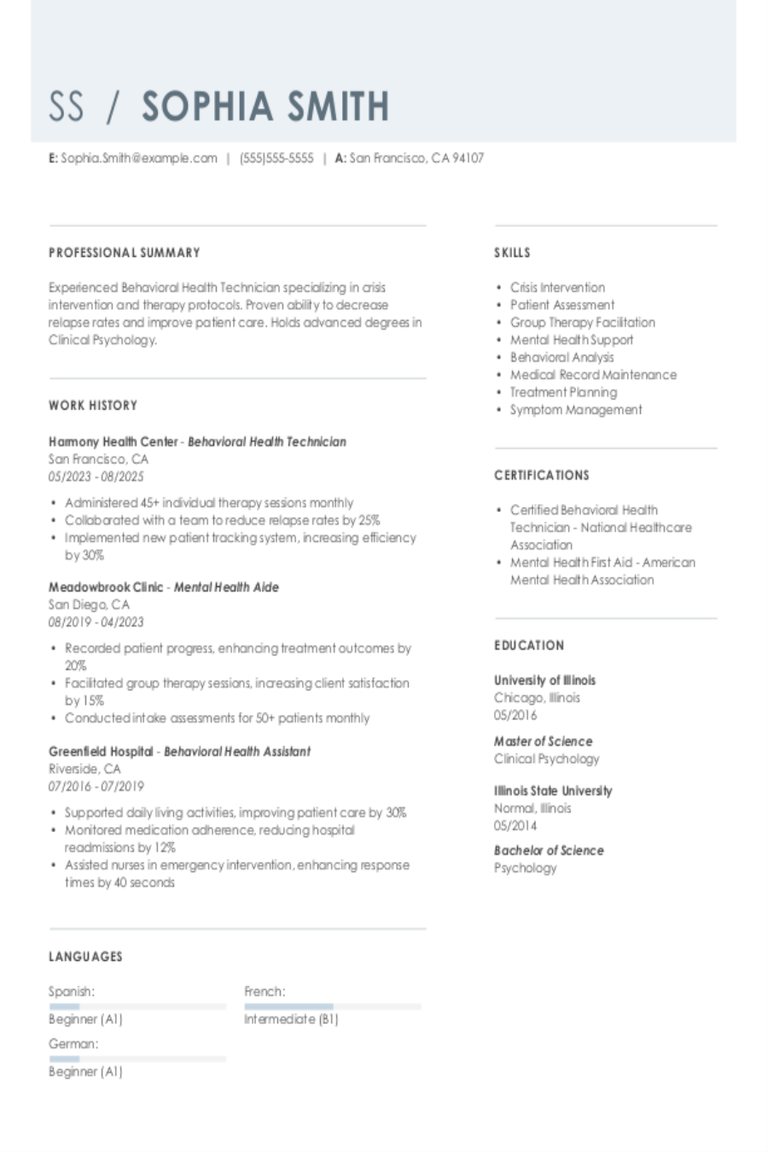
Behavioral Health Technician Resume Examples & Templates
Explore how behavioral health technicians showcase their experience in patient care and crisis intervention. These examples and tips will help you highlight key skills and relevant tasks to make your

Behavioral Interview Questions & Answers: Your Guide to Acing the Interview
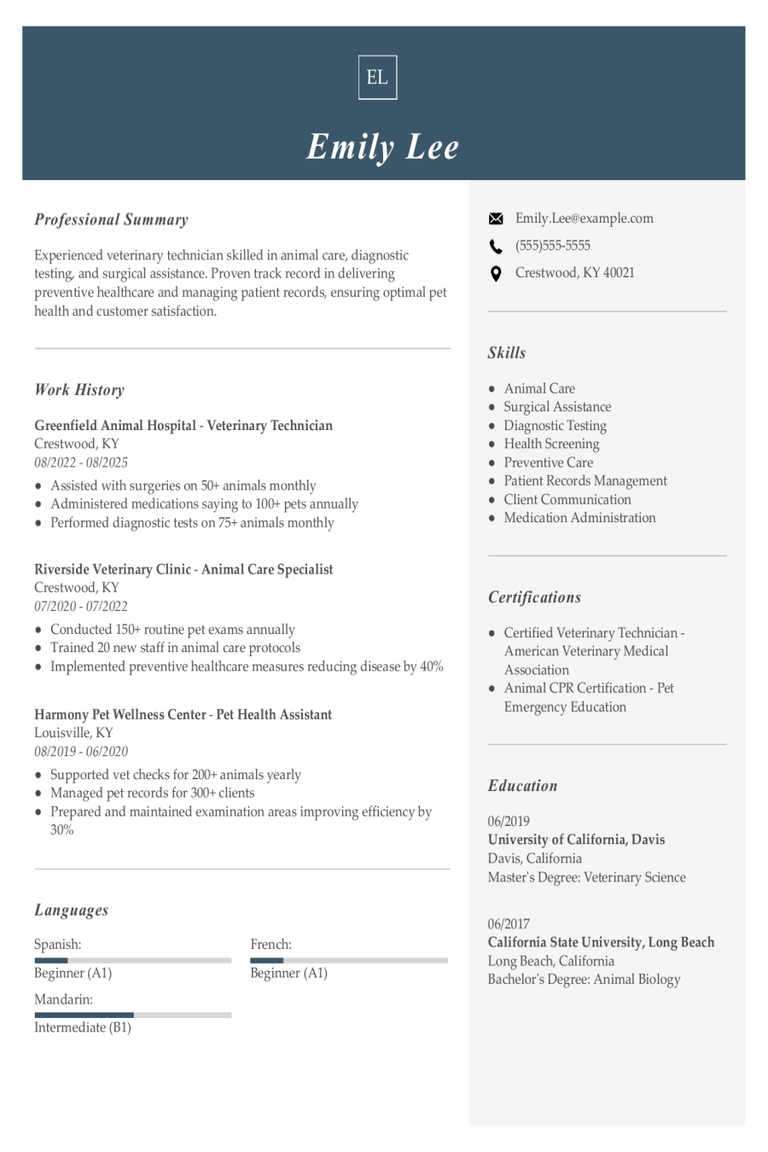
Veterinary Technician Resume Examples & Templates
Explore veterinary technician resume examples and tips to learn how to showcase your experience caring for animals, assisting vets, and handling lab tests. These samples and tips will help you
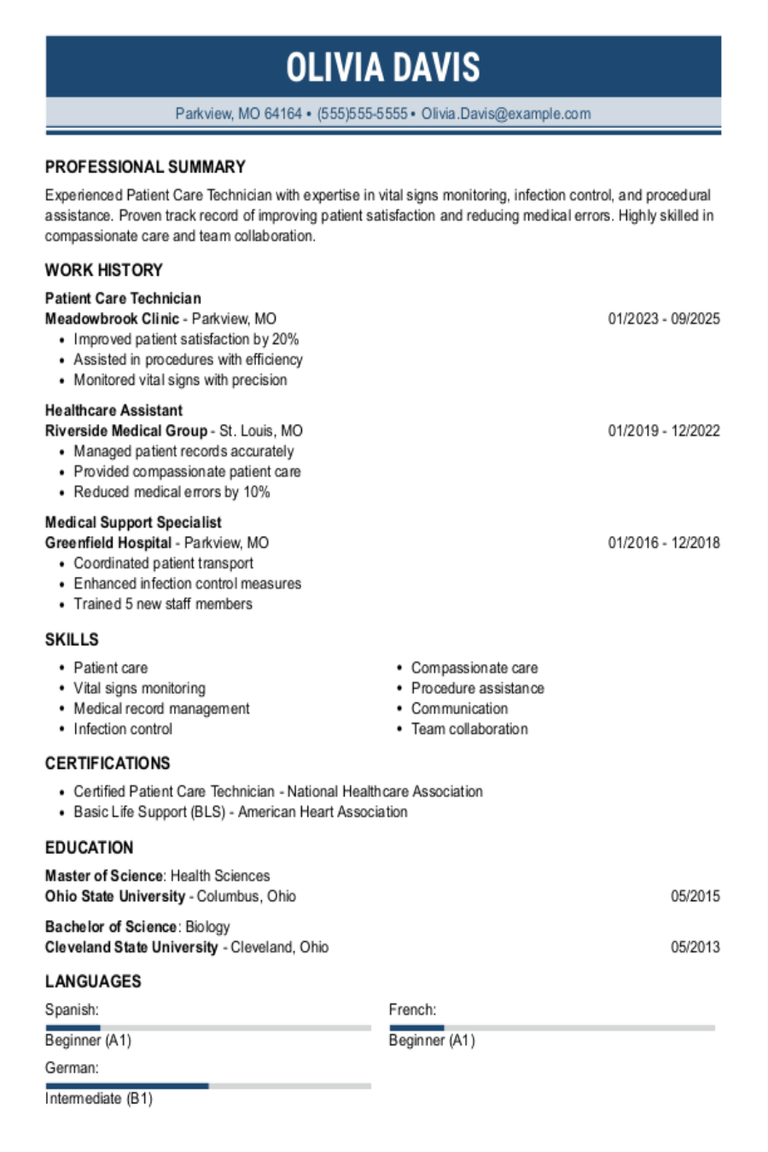
Patient Care Technician Resume Examples & Templates
Explore patient care technician resume examples to see how to highlight your skills in assisting patients, monitoring vital signs, and supporting medical staff. Discover tips for showcasing your experience in
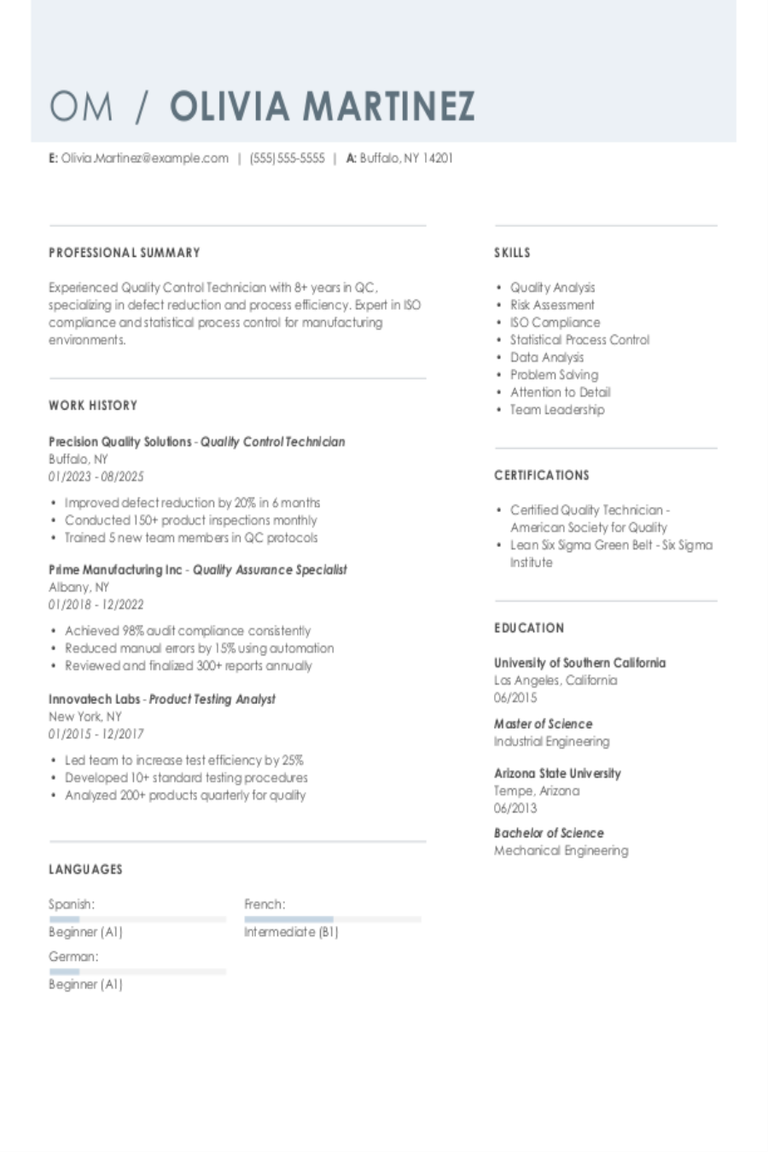
Quality Control Technician Resume Examples & Templates
Browse quality control technician resume examples to see how to list your skills in testing and inspection. Discover tips on sharing experiences that demonstrate attention to detail and problem-solving abilities
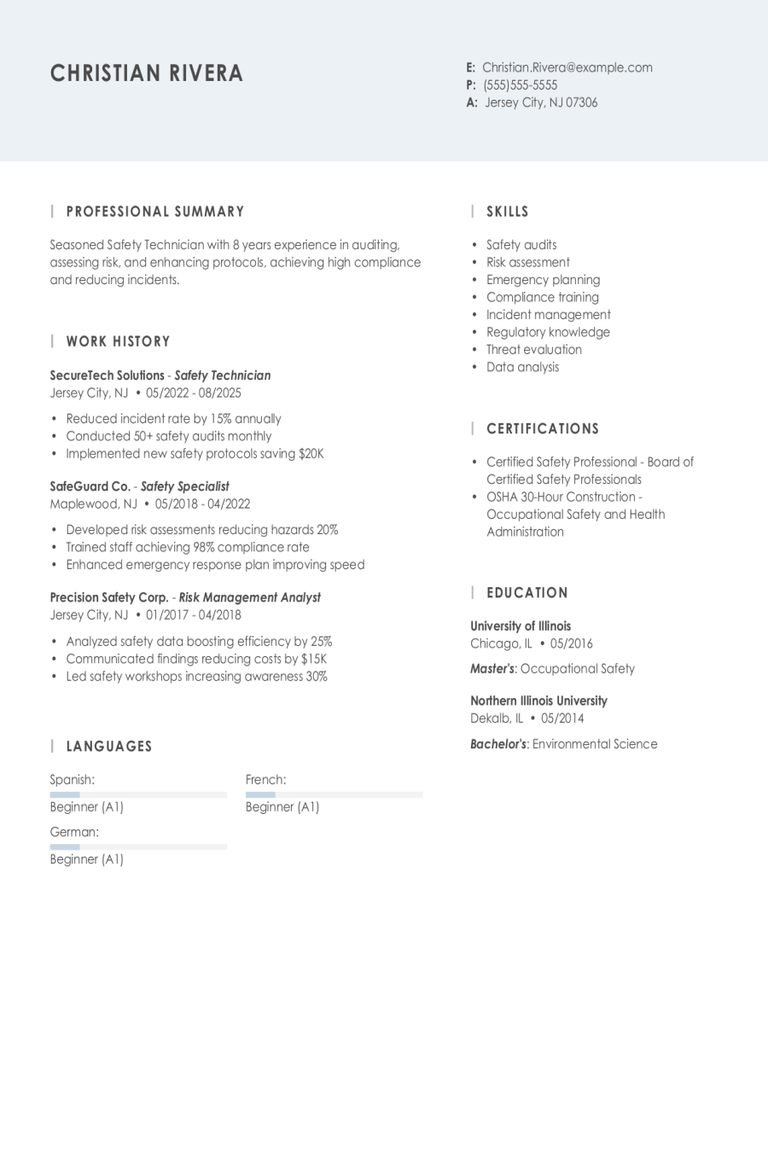
Safety Technician Resume Examples & Templates
Explore safety technician resume examples that focus on skills like problem-solving, equipment checks, and teamwork. These examples and tips will help you show employers you’re ready to keep workplaces safe
